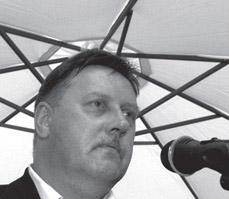Vidmantas Bartulis enjoyed exceptional success at the Lithuanian Composers' Union Awards for the best compositions of 2003. He not only took the best orchestral work award (for the oratorio Poor Little Man Job), but was also awarded "Composer of the Year" by a separate decision of the jury.
|

photo: Mikhail Rashkovsky
|
Currently a very active and successful composer, previous laureate of the "Best Theatre Composer" award, and of the highest Lithuanian National Award for Culture and Arts, Vidmantas Bartulis is celebrating his 50th anniversary with a wealth of works covering nearly every possible genre, and with grand-scale plans for the nearest future. Among Lithuanian composers, Bartulis is unrivalled in his versatility of styles, genres and sensitivities, continuing to surprise audiences with unexpected twists and turns in every new work. He can write anything – from chamber miniatures to opera and large orchestral works, from harmonizations of folk songs to huge open-air events, from a monumental Requiem to music for fashion shows, arrangements of pop hits, etc.
His early compositions were marked by contemplative, elegiac moods, a particular laconicism and the frequent images of nature typical of the whole generation of Lithuanian composers labelled 'new romantics', by the time of their debut in the late 1970's. It was probably his substantial experience as a theatre composer (to date, Bartulis has authored incidental music for nearly 200 drama and film productions) which motivated him to take up independent direction of his own 'dramas' – spectacularly surreal, uncannily ironic compositions of instrumental theatre, which caused a great stir in the late 1980's. In these 'dramas', we meet musicians wearing bizarre masks, threatening avalanches of electronic sounds, appetizing smells circulating the hall, circus numbers, fireworks and a host of other surprises, with the composer himself sometimes taking on an indispensable role – e.g., as in his chamber opera,
A Lesson, after Eugène Ionesco (where Bartulis conducts not only his strange virtual orchestra, but also the entire plot of a powerful drama of absurdity and suspense), or in the funereal burlesque
Performance: Amen, which includes a wake, and the resurrection of the composer...
In nearly all of his compositions, Bartulis recalls his favourite music from the past, inserting certain fragments and remodelling their meaning within present-day controversial contexts. His attitude towards the work of the paraphrased author is quite ambivalent: on the one hand, nostalgic adoration and cautious assimilation of the borrowed music, and on the other – a healthy dose of idiosyncratic humour; a roguish reply to the sentimental longing for 'lost harmony' – the posture of a light farce, albeit veiling certain tragic undertones. A good example is
I Like H. Berlioz (the most recent of his numerous series of works with titles beginning with:
I Like...) for string quartet and piano (with a version for flute and string orchestra): the suspiciously idyllic mood created by continuous repetitions of Berlioz's harmonic and melodic building blocks is eventually destroyed by violent strokes of piano clusters – as if the music was becoming intoxicated by metastases of its own beauty. And after the tension gradually discharges, the re-emerging tranquillity is no longer the same as before – it is now rather an enigmatic ellipsis, the meaning of which it is up to every listener to find out for him/herself.
Sometimes the use of borrowed music in Bartulis' work is so extensive that it reaches a degree where the composer seems to dissolve his own identity. A postmodernist shift of the paradigm occurs: the composer is now a bricoleur, a curator, a DJ. In his open-air event,
Our Lithuania, Bartulis manipulates huge forces, including folk ensembles, a military marching band, jazz musicians, and local rock scandalizers, freely mixing their repertoire to create a show commemorating the national holiday – both entertaining, and solemn enough – as befits the occasion. And he keeps the audience's attention for nearly two hours.
Bartulis' present work, however, is not as 'freaky' as his instrumental theatre from the late 1980's (which he jokingly called 'physiological music'); it seems rather to be a certain synthesis of the tendencies of the former and of his 'romantic' period, i.e., the late 1970's. Having traversed the arena of the sacred and the mundane, academic art and pop culture, Bartulis displays a seemingly effortless ability to blend very different influences and qualities in his music, in the most organic and elegant way. Here you can feel ostensible frivolity and deep concentration, sarcasm and melancholic sincerity, intimacy and massive dramatic effect, existential chill and overpowering bliss – all at the same time... And as always, there is a place for different, unexpected deviations. Some of his plans for the nearest future include a new vocal-symphonic work for the Gaida Festival, which promises to be quite smooth and euphonious – in the vein of traditional 'beauty' and bel canto art. His large mystery play for the Pažaislis Festival, with folk singers, choirs, video and light shows, will feature a story about Curonians, a now extinct Baltic tribe. And his 'surrogate rock opera' (in the words of the composer) for the St. Christopher Summer Music Festival is intended to be a good-humoured cabaret about Lithuanians joining the EU...
© Linas Paulauskis
Lithuanian Music Link No. 8

